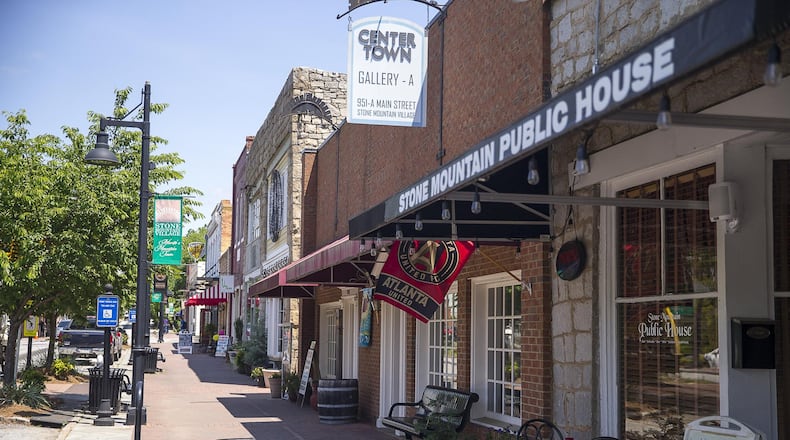When Shante Lewis wants to go grocery shopping close to home, it doesn’t take long for her to list her options.
“We have a Dollar General,” the Stone Mountain resident said. If she wants to drive a little farther, she can visit a “Food Depot” or a Walmart, which has a grocery section.
Much of the city of Stone Mountain — along with large portions of southern and eastern DeKalb County — is considered a “food desert” by the United States Department of Agriculture, defining it as an urban area with limited access to high-quality, fresh food.
But a group of Stone Mountain residents is working to bring more life to the small town. The community-led “SMV Market” will supply residents with fresh food and other essentials you could find at a grocery store, said Lewis, who is leading the effort. The market hopes to set up shop in downtown Stone Mountain later this year or early 2020.
» MAP: Food deserts in metro Atlanta
“The goal here is to really bring fresh food into our city center,” Lewis said, noting that SMV Market — short for Stone Mountain Village Market — will prioritize selling food from local farmers and other food providers.
SMV Market has been nearly two years in the works, and will operate as a nonprofit, said Lewis, who works in real estate. Organizers plan to begin fielding donations from the community this month.
The idea for the store sprouted when Lewis and other residents became frustrated with the small, 6,300-person city’s limited fresh food shopping options. Currently, a temporary farmer’s market sets up downtown for three hours on Tuesdays.
“I want to be able to grow old in my house. I want to be able to walk and get my groceries,” said Mary Sommers, who has lived in the area since 1967. Right now, she said, “It’s not easy to get groceries. … Some people have a hard time getting fresh food.”
Credit: United States Department of Agriculture
Credit: United States Department of Agriculture
The USDA has identified the city of Stone Mountain as an area that is less than one mile from the nearest supermarket, meaning it could be considered a “food desert.” Much of metro Atlanta has a similar designation, including parts of southern Fulton County, southwest Atlanta and northeast DeKalb.
Across South DeKalb specifically, residents have seen major supermarkets like Publix, Walmart Neighborhood Market and Kroger close in recent years, The Atlanta Journal-Constitution reported last year. The Publix near the corner of South Hairston Road and Covington Highway was replaced with a Goodwill store, which opened last month.
Research shows that food deserts are usually also lower-income areas; the city of Stone Mountain’s median annual household income was estimated at $38,670 in 2017. For comparison, the median household income for all of metro Atlanta is $65,381, and $55,876 for DeKalb County, according to the U.S. Census Bureau’s latest estimates.
Other parts of the metro area are practically food oases. In a one-mile stretch in the North Decatur area, shoppers have their choice of a Whole Foods Market, Kroger, Sprouts, Walmart and Aldi.
Lewis said the term “food desert” can seem misleading and often comes with a overly negative stigma; Stone Mountain is nothing like a barren wasteland one might associate with a “desert.” But the term still represents the serious issue of food access.
“We have a lot of residents that do not have cars, or are too old to drive, so we think bringing fresh food to them on a regular basis would improve the health … of our community,” she said.
The direct health effects of living in a “food desert” are still unclear; after all, the metrics used to measure them are somewhat arbitrary, said Jerry Shannon, a University of Georgia professor who has studied food access in urban areas. But living far from a grocery store still has its difficulties.
“There’s a real sense of loss of local control. Communities don’t have that connection with a local store that they feel like is a good option,” Shannon said. Having to go further for food can also simply “add to the overall background stress and anxiety of being low-income or living in a low-income neighborhood.”
SMV Market organizers hope the new store can also contribute to the revitalization of downtown Stone Mountain, which sits just a mile from popular Stone Mountain Park. The Main Street corridor currently has a number of empty storefronts, though city officials say the area is on the upswing.
“I think folks are willing to bend over backwards to help there be a space” for the store, said Thom DeLoach, a board member for the city’s Downtown Development Authority.
Several other businesses, including 13th Colony barbeque and Outrun Brewery, are also slated to open soon in the village. But a market, DeLoach said, “was always top of the list of what folks really wanted to have in town.”
About the Author
The Latest
Featured





